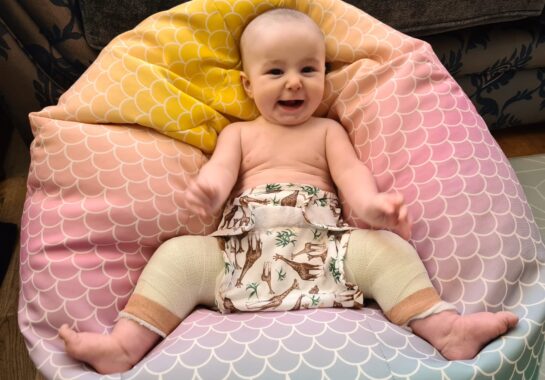A new study, led by researchers at the University of Liverpool, has identified that NHS infant checks can miss serious hip abnormalities in new-born babies. Left undetected, these can require complex surgery, and lead to early arthritis. In the UK around 500 infants undergo surgery for dislocated hips which could have been avoidable.
In collaboration with the University of Oxford and University of Leeds, it shows that the tests currently used by doctors can be unreliable. Using data on 27,000 babies, their research found the best tests miss over half of abnormal hips – and indicates that for every 1000 hips screened, 4 dislocations will be identified, but 5 will be missed.
Developmental dysplasia of the hip (DDH) is a condition where the “ball and socket” joint of the hip does not properly form in babies and young children. DDH is one of the most common musculoskeletal conditions in infants and around 1 in every 100 babies are born with the ball of the hip bone dislocated from the socket.
If a dislocated hip is diagnosed early, it can usually be treated with a removable brace that the baby wears over their clothes for a couple of months. However, delayed diagnosis often requires complex surgery, and can lead to early arthritis requiring a hip replacement when the children become young adults.
The NHS baby hip screening checks involve several clinical tests, performed within 72 hours of birth and again between 6-8 weeks. However, researchers highlight there has been some doubt concerning the reliability of these tests, so the study set out to evaluate the diagnostic accuracy of clinical examination in identifying dislocated hips in infants.
Professor Daniel Perry, NIHR Professor at the University of Liverpool and a children’s orthopaedic surgeon at Alder Hey Children’s Hospital said: “Doctors have known for some time that there are challenges with the newborn hip examination and this study confirms the problem. What brings additional concern is that all hip examinations in this study were conducted by experts in hip disease – which is not usually the case in the NHS – so the true problem may be bigger. Nevertheless, we’re determined to make things better.
“NHS England has recently started working with the National Institute for Health and Care Research (NIHR) to begin research to improve hip screening amongst babies. Just last week NHS England launched a change in the hip screening pathway for babies, which will enable the UK to be world leaders in research this area. We hope that this could soon mean new tests on the hips of babies, such as artificial intelligence enabled ultrasound. It’s heartening to see a new collaboration between NHS England and NIHR which I hope will translate into better care for children and young people.”
This research was funded by the National Institute for Health and Care Research (NIHR), the research partner of the NHS, public health and social care. It was supported by the NIHR Oxford Biomedical Research Centre.
The paper, ‘Does This Infant Have a Dislocated Hip? The Rational Clinical Examination Systematic Review’ was published in JAMA (DOI:0.1001/jama.2024.2404).
